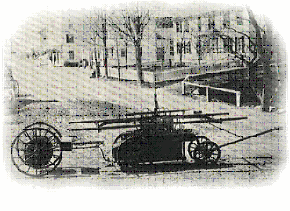
“A Legacy Lost, But Not Forgotten!”
The following information was obtained from numerous Hudson newspaper archives, books and reports such as “ The Hudson Pioneer “, “The Hudson News “,“The Hudson Daily Sun” and “The Hudson Enterprise” with the help of the Hudson public library, and the Hudson historical society. Information was also obtained through the compilation of the Hudson Fire Dept. town reports compiled by Ff. Robert Washburn of Lexington Fire. The following books were used as well “Hudson Past and Present” and the revised edition “Hudson Yesterday and Today” by E.F. Worcester, and the Eureka Engine Co. book published 1886. This is not a complete history of the department as we do not have access to many reports or photos. If you have any information pertaining to the early history of the Hudson Fire department and are willing to share copies of any photos or reports please contact us. Thank you!
Sincerely,
Firefighter Robert O’Hare
The earliest history of the Hudson Fire dept begins within the Town of Marlborough. Hudson was part of Marlborough and was known as the North Village. Most of the early settlers were farmers and wanted to preserve the town as a farming community, but as the town progressed it soon became known as the Mills. Around 1799 the town was called Feltonville, named after Silas Felton who was one of Hudson’s wealthiest merchants at that time.
It was on January 17, 1842 that a meeting was called to order for the young men of Feltonville to take into consideration the best methods of forming an Engine Co. The “Feltonville Engine Co.” was formed with a membership of twenty-one men, with Francis Brigham named as the foreman. By mid summer an engine was obtained, mainly through the efforts of Mr. Charles Brigham and cost about two hundred dollars. It was nothing more than a “tub” as it had no suction hose and needed to be filled with pails. The company disbanded in 1843 with a new company lasting until about 1847, when a second reformation was made.
In 1849 Marlborough voted to furnish the North Village “Feltonville” with a new engine, providing that the citizens of that village would provide the engine house and its company. A new engine company was formed consisting of thirty eight members and the engine was received July 9, 1849. The engine was called “Hydraulicon No. 3” (This is one of three suction type hand tubs built by the Howard & Davis Co. of Boston delivered to Marlborough in 1849) Her first actual service took place November 14, 1849 at a fire in the south part of Bolton, a barn belonging to James Howe although she was placed in service July 11 1849.
On September 7, 1857 the engine company name was changed to “The Eureka Engine Co. No. 3 of Marlborough. In 1860 the engine house was built on the east side of Washington St. near School St. just south of the river.
On March 16, 1866 the Town of Hudson Mass was incorporated and broke off from Marlborough. Thus begins the organization of the Hudson Fire Department. It was on may 27, 1866 that a new engine company was formed and was to be known as “ The Eureka Engine Co. No. 1 “ of Hudson. It was also voted to buy new uniforms and to invite all members of the old Eureka Engine Co. No. 3 to become new members of the Eureka Engine Co. No. 1. Besides this, the oldest company in the history of the town, there is the Bucket Hook & Ladder Co., Independent Hose Co., H.E. Stowe Hose Co. and the Relief hook & Ladder Companies.
These companies, with one hundred hydrants to furnish water, afford ample protection against fire, as has been proven in many cases.
1842
A meeting was called on January 17th for the young men of Feltonville to form an engine company. A bucket filled hand tub was obtained for $200 through the efforts of Charles Brigham. The Feltonville Engine Co. was est. with Francis Brigham as foreman, James Wilson as 2nd foreman, Francis D. Brigham as clerk & treasurer, Alonzo Wood as 2nd, Charles Brigham and John Peters made a standing committee. The members of the company in addition to the officers are as follows: Silas Fairbanks, Silas H. Stuart, Walter Bruce, Nathaniel Smith, Philo A. Randall, Obed Rice, also W. Walcott, William F. Trowbridge, Lorenzo Bruce, H.R. Bancroft, Earl Southwick, Daniel Farnsworth, Daniel Pope, Abraham Tyler, R. Bacon, and William Chase. Most of these men were very prominent men who contributed to the growth of the town. The men were paid two dollars a year, and good behavior was essential to remain a member. Meetings were very intermittent, in some instances several months would pass between meetings.
1843
Feltonville Engine Co. disbanded due to many of the “volunteers” becoming weary of their duties and withdrawing from the company. A new company was formed once again, this time lasting until about 1847.
1847
Once again the Feltonville Engine Co. disbanded, and on January 30th, a second reformation of the company was made. Francis Brigham was elected as foreman and William F. Trowbridge as 2nd foreman, there is no record of the choice of clerk or other positions within the company.
1849
Marlborough voted to furnish the North Village, (Feltonville) with a new hand engine providing that the citizens of that village furnish the engine house and the engine company. It was on May 21, 1849 that Alonzo Wood and thirty-seven others signed an agreement to form such a company. On June 28th a meeting of these signers was called to order by Francis Brigham. F.B. Fairbanks was chosen as the chairman, and W.F. Trowbridge as secretary, and for the forth time in seven years the organization of a fire company was proceeded with. The lists of members are as follows Silas B. Fairbanks was made foreman, Loring Cox as second officer, Francis Brigham as third officer, and W.F. Trowbridge chosen as company clerk. The company organized under the name “Hydraulicon Fire Co. No.3”. In addition to the officers the names of the members were Daniel Pope, Joseph S. Bradley, Philo A. Randall, Walter Bruce, Daniel Farnesworth, Charles Brigham, Alonzo Wood, Jonathan Randlett, George Houghton, John H. Brigham, Alden B. Gleason, W.H. Horton, Abel H. Pope, Cummings E. Johnson, Francis S. Bernard, James priest, Christopher B. Hapgood, Henry J. Wood, Silas H. Stuart, Obed Rice, Wm. Randall, Wm. E. Wood, James S. Welth, Alden Burnham, Seth G. Haskell, Caleb Haskell, Wm. H. Chamberlain, Nathaniel Hapgood, Jonathan Ray, Baxter Wheeler, Philo Bruce, Chas. E. Witt, Geo. D. Witt, Lorenzo Bruce, Joseph Manning, Ezra Crocker, Charles S. Bennett, Geo. Fuller, Levi Ellithorpe, and Josiah Q. Packard.
It wasn’t until July 9, 1849 that the new hand engine was received. This was one of three suction type hand tubs delivered to Marlborough, and manufactured by the Howard & Davis Co. Boston. It being late when the “tub” arrived, she was not worked until the evening of July 11th. On July 14th, Daniel Farnsworth, Joseph S. Bradley, and Jonathan Randall were chosen as suction hosemen, and Joseph manning, Wm. F. Trowbridge, Caleb Haskell, and George Houghton chosen as leading hosemen. On October 20th, on a motion from Francis Brigham, a committee was appointed to doctor the by-laws for the company.
November 14th at approximately one o’clock in the afternoon, there was an alarm of fire, caused by the burning of a barn and hay belonging to Jonas Howe. The barn was located in the south part of Bolton; the new engine was brought into service for the first time and worked until about five o’clock. The officers expressed themselves well pleased with the machine and the company. The engine’s 1st muster was on December 1st, a friendly bout against Marlborough’s engine No.1 and 2. Possibly the other hand tubs delivered to Marlborough from the Howard & Davis Co. the winner was not identified.
1851
February a speaking trumpet was presented by W.E.C. Worcester to Capt. Pope and his successors in office. On October 11, the company was once again reorganized with the following signing members. Daniel Pope, W.E.C. Worcester, Jonathan Randall, Abel H. Pope, Wm. F. Trowbridge, Sam. J.M. Weston, Silas Fairbanks, Lorenzo Bruce, Alden B. Gleason, J.S. Welsh, Thomas Bridges, A.L. Maynard, C.B. Hapgood, W. Fuller, Jonas T. Houghton, Henry C. Snow, W.E. Wood, W.H. Horton, J.S. Bradley, Caleb Haskell, Wm. H. Chamberlain, Ezra Crocker, Levi P. Ellithorpe, Geo. Manson, Henry Fuller, Francis L. Bernard, John McKenzie, James Mann, Donald Ross, Eph. S. Bemis, Daniel B. Snow, Seth G. Haskell, Edward Fitzhenery, Philo A. Randall, Chas. E. Witt, George Stratton, John Y. Witt, James W. Gleason, Henry Moore, Ariel Crosby, Charles Shippen, Sidney Brigham, John Bruce Jr., Geo. W. Brown, John Robinson, Wm. A. Brigham, Wm. L. Osgood, W.G. Locke, Stillman Locke, Franklin Wright, Geo. H. Munderall, Alonzo Warner, Baxter F. Wheeler, Rufus H. Brigham, Geo. W. Warfield, J.R. Stone, E. Andrews, Jonathan P. Nourse, Marshall Wood, Wm. S. Fry, Augustine G. Walcott, David Ross, Solon Wood, Chas. Farnsworth, Wm. Hapgood, Marshall Whitcomb, Edwin Welsh, N.A. Gay, Jonas Southwick, Aaron S. Hale, Charles M. Randall, Timothy S. Leary, Stedman Arnold, George J. Maynard, Charles A. Ross, Marshall Wetherbee, George P. Fairbanks, Richard Barry, Charles L. Woodbury, James C. Trowbridge, Lorenzo Walcott, Nestor S. Fairbanks, Lucien Cox, John M. McKenzie and Wm. F. Brigham.
1852
December 27th a fire took place at the first church built in Hudson. It was the Methodist Church located on top of gospel hill. It was a brick building and they were planning on renovating the building just prior to the fire.
1854
Late March a meeting was held at which on motion of Wm. F. Trowbridge, Daniel Pope, Francis Brigham and S.B. Fairbanks were Chosen as candidates for a board of fire engineers. On June 5th there had been a heated discussion over the matter of new uniforms, on which occasion Charles S. Bennett, Ariel Crosby, John Bruce, George Brown, Ezra Crocker, Augustine Walcott, John McKenzie, and Marshall Whitcomb all resigned and were honorably discharged.
1857
September 7th a vote was taken by the company to change the company name to “The Eureka Engine Co. No.3 of Marlborough.
1860
January 4th the new Eureka Engine house having been completed was dedicated. The company met at the old engine house and escorted the fine members and invited guests to the new engine house. The house was located on Washington St. near School St. just south of the river. The presentation speech was made by Mrs. J. Houghton, and was responded to by the foreman. A very eloquent speech was given by the Rev. L.E. Wakefield. Addresses were made by Marlborough Chief engineer Frost, Messrs. C. Brigham, Elbridge Howe, T. Hapgood, F. Brigham, George E. Manson and others, after which a supper was served, provided by the ladies, and a dance was held lasting until midnight.
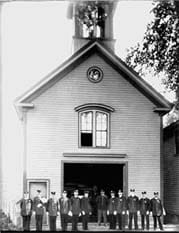
1861
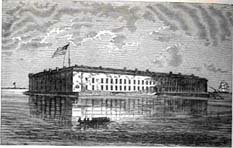
The Civil war began on April 12th with the attack on Fort Sumter. On June 29thseveral companies of the Marlborough Fire Dept. detailed twelve men each to escort military companies into camp in Boston, preparatory to going to war. The Eureka Co. detail consisted of C.M. Randall, S.H. Stuart, G.W. Warfield, W.H. Chamberlain, A.B. Gleason, C.L. Woodbury, A.K. Graves, George Stratton, George Houghton, W.F. Brigham, John McKenzie, and W.F. Newton.
1862
August 6th the Eureka Engine Co. performed escort duty on the occasion of the departure of recruits going to war. On August 30th the company voted to turn out when Co. I of the 5th Regt. Leave for camp. S.B. Fairbanks, C.M. Randall and George Randall were chosen as a committee to present 1st assistant A.H. Pope with sword and belt, he having been wounded and lost his sword at the battle of Antieam.
1863
June 15th the Eureka Engine Co. provided a supper for Co. I of the 5th Regt. Francis Brigham and Wm. F. Trowbridge were chosen as the committee to proceed to Boston and give Co. I, 5th Regt., an invitation to return home through Feltonville on their discharge from the U.S. service. The foreman challenged to turn out forty-five men, if they did he would pay for all the refreshments they needed, if not the company should pay for all he needed. The challenge was accepted and the foreman had to pay the bill. On June 26th those veterans of Co. I, belonging to Feltonville, Berlin, and Bolton, were received by the Eureka’s and entertained at the engine house.
1866
March 5, 1866 the company voted to remit all fines of members in the US service, also on this date a committee was appointed to take into consideration the subject of no longer being part of the Fire Dept. of Marlborough due to the upcoming incorporation of the town of Hudson, and to see what the town of Hudson purposes to do for the Fire dept. On March 16, 1866 the town of Hudson Mass became incorporated, thus begins the organization of the Hudson Fire Dept. On May 27, 1866 another engine company was formed to be known as the “Eureka Engine Co. No. 1 “of Hudson. Abel H. Pope was elected as foreman. A vote was taken to buy new uniforms and invite all former members of Eureka Engine Co. No.3 to become members of Eureka Engine Co. No.1.
1871
March 6, 1871 a vote was taken to insert an article in town warrant at the April meeting to see if the town will purchase a new hand engine for the Eureka Engine Co.
1872
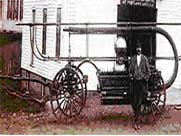
May 18, 1872 a new hand engine was purchased from L. Button & Sons of Elmira, New York. This hand tub replaced the original Eureka engine, the “ Hydraulican No.3 “ Howard & Davis machine which was turned over to a company of young men and rechristened ” Houghton Engine Co. No. 2 “, Henry L. Hurlburt Esq. Of Lynn being made foreman. This engine company was completely volunteer and was not paid by the town at this time. The engine company was housed at the Houghton Co. from 1872-1875.
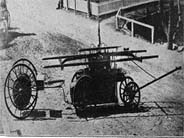
1873
As of July, 1873 the Eureka Engine Co. No.1 meets the first Monday of each month in the engine hall located on Washington St. with R.H. Brigham as foreman. The Houghton Engine Co. No.2 meets the first Monday of each month at the engine house located on Houghton St. T.D. Hapgood as foreman. On October 4, 1873 the Eureka’s take 2nd place in a muster held in Athol Mass, with a stream reaching 195’. On October 23, 1873 the Eureka’s take 1st place in a muster held in Leominster with a stream reaching 224’9”.
July 21, 1873 a committee was formed for the purchase of a bell for Houghton Hose Co. No.2. E.M. Comery of Pepperell, the first foreman of the company was the secretary and treasurer of the bell committee along with H.E. Stowe, and F.O. Welsh. It was their recommendation that the company purchase a bell at a cost not exceeding $140. The committee further recommended that the bell be hung without a wheel thereby saving about $30. On August 15, 1893 Naylor & Company of Boston billed the bell, charging $130 for it. The first bell did not prove satisfactory to the company or to the citizens, consequently it was exchanged for an English cast steel bell, the cost was $82.86 more than the first bell or $212.86.
1874
February 18, 1874 the Eureka’s celebrate their 25th anniversary by hosting an anniversary ball. On April 14, 1874 the Houghton Engine Co. receives a new bell replacing the present one which did not give the best satisfaction. The new bell weighs about 600 lbs. On May 23, 1874 town selectman appointed S. B. Fairbanks as Chief Engineer of the Hudson Fire dept. for the ensuing year. On June 6th, 1874 Houghton Engine Co. No.2 obtain estimates for new uniforms for their current sixty-two members. They propose a blue shirt with red trimmings so to be in exact contrast with Engine Co. No. 1’s red shirt with blue trimmings.
July 4th, 1874 Hudson’s first disastrous Fire! Kaler & Shaw Piano Top Factory Fire. Click here to read more.
July 25th, 1874 The George Houghton Hose Co. reorganized with Charles Laser as foreman, E.A. Holyoke 1st assistant, George W. Houghton 2nd assistant George L. Day as clerk and treasurer and J.L. Robinson as steward.
August 13th, 1874 Houghton Engine Co. No.2 made their first public appearance in their new uniforms, collation was served in the engine house, and speeches were made by the captains and others. On August 21st, 1874 Houghton Engine Co. No.2 was presented with a $75.00 silk flag by Mary O’Donnell, an active leader in the movement to secure the banner.
1874-1875 Houghton Hose Co. asked the town to furnish them with a new Hand engine, the town refused and the company disbanded. Click here for a story on this event taken from an article in the Hudson Enterprise written on April 2nd , 1892. I could not find any archive newspapers for the year 1875 to follow up more on this story about the company disbanding, but was able to find more about the company bell. On Nov.17, 1887 F.O. Welsh wrote to Mr. Comery and other members of the now disbanded Houghton company, stating that it was proposed to ask the town at the next March meeting to organize a new hose company and build a new hose house in the easterly part of the village near the depot. He further wrote that it would be a good idea to couple the request with the proposition to furnish a bell for the house in case it should be built. The company referred to was the H.E. Stowe Company and the bell was the old Houghton Company bell. The Company became a part of the regular fire department, but the house was not granted. The bell could not be furnished because all members of Houghton Hose Company would not consent to it.
Last March Mr. Welsh again corresponded with the members of Houghton Hose Co. and as everyone knows they consented to it’s being given to the Independents. The sentiment of the old Houghtons was that the justice of their claim to the bell had been proven by the lapse of time, if in know other way. The story was taken from an article in the Hudson Enterprise written on April 2nd, 1892.
1875
In January of 1875, the town voted to procure a Hook & Ladder truck, and organize a company. A dozen people met in the Houghton Engine Co. No.2 house, on February 6th and organized the company. A committee consisting of James H. Shaw, James C. Robertson, W.E.C. Worcester, George T. Fletcher, and H.E. Stowe, drafted the constitution of the company. The meeting was called to order by J.H. Shaw, and presided over by A.S. Trowbridge, and H.E. Stowe was clerk. Officers elected were foreman, James C. Robertson, 1st assistant, A.S. Trowbridge, 2nd assistant, J.P. Clare, clerk and treasurer, H.E. Stowe, and steward, J.S. Kennedy. February 20th the company adopted the name “Relief Hook & Ladder No. 1“. May 22, 1875, the town purchased a Hook & ladder truck from H.F. Keys of Clinton for $690.Around this time the Independent Hose Co. was also organized.
September 24, 1875 Bucket Co. No. 1 was organized under the name “Eagle Engine Co.”, and was composed primarily of young boys, most in their middle teens, and for apparatus had a small box that was described as being only suited for use as a play thing. June 1, 1876 they reorganized as “Bucket Co. No.1”. For apparatus they had a very small light truck with ladders and buckets hung to the truck. (The above information about the Relief H&L and the Bucket company was obtained from the Hudson News September 1899).
Sometime during 1875 the Houghton Hose Co. disbanded, Fire dept now consists of Eureka Engine Co No.1, and the Relief Hook & Ladder Co.
1876
Fire at the Tripp Brothers Box Factory, the following story was in the Hudson news. Click here to read more.
1877
May 12, 1877 at the May town meeting, the town voted to constitute the Independent Hose Co. as part of the regular fire department and to pay them accordingly. Now the Fire Dept. consists of the Eureka Engine Co. No.1, the Relief Hook & Ladder Co. and the Independent Hose Co. A vote was also taken to leave the matter of housing Engine Co. No.2 and its fixtures with the engineers and the town selectman.
July 18th there was a great fire in Marlboro, the T.A. Coolidge shop was destroyed and estimated at over $100,000 loss also in July six powder mills explode in Acton.
1879
May 10, 1879 Eureka Engine Co. held its annual election, electing the following board of officers. R.H. Brigham as foreman, and B.F. Wheeler as 1st assistant.
July a tornado hits Hudson with minimal damage when compared to surrounding communities.
August 6th the house and barn of John McKenzie burned on Church St., with $2,300 damage, any newspaper articles describing this fire are missing from archives.
October 18th the story about three fires in Hudson was printed in the Hudson Enterprise. From the Marlboro Advertiser Oct 15th “Is there a Fire bug in Hudson?” Click here to read more.
1880
October 3rd, a tenement block on Main St. burned causing over $30,000 in damage. The story was printed in the Marlboro Mirror on Oct. 9th. No other articles could be found due to the fact that the Oct. 9th issue of the Hudson Pioneer is missing. Click here to read more.
1881
In March the following Articles were purposed in the town warrant. Article 18: To see if the town will purchase land and build an Engine House for the fire dept., it is also recommended that the engine house is to be a double house made of brick with a slate roof which would make it comparatively fire proof. This was passed at the May town meeting voting that it be done at once and appropriating $2,500 for that purpose. Article 19: To see if the town will recognize Bucket Co. No.1 as part of the dept., this also passed and the Buckets consisting of 12 men became part of the department.
July 25th between nine and ten o’clock Monday morning fire burst forth from the barn belonging to John Dolan, and quickly spread to the shed and house. Click here to read more.
October 15th 1881 Engine House is being built on the east side of Felton St. near Wood Square, some have commented that it is too close to the street and should be moved further back, but it is continuing to be built right where it is. This Engine House will be for the Independent Hose Co. No.1 and Relief Hook & Ladder No.1.
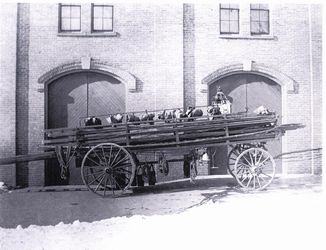
1882
March 11, 1882 the following articles were in the town warrant. Article 14 to see if the town will purchase a new bucket truck for Bucket Co. No.1 and, Article 18 was to appropriate $1,100 to complete the brick Engine House on Felton St.
A small article was written in the Hudson news about the request of a new bucket truck for Bucket Co. No.1.
“The voters of Hudson at the approaching annual town meeting will be obliged to seriously consider the question of purchasing a new apparatus for the Buckets, or having the Fire Dept. deprived of one of its most effective arms of service. The record of this company is such that only a lack of wisdom and prudence on our part will ever allow them to disband for lack of apparatus to work with. They organized in 1875 and began running in 1876, since which time they have been on hand at 48 fires arriving first on 22 occasions and second on 11 occasions. The present apparatus and the only uniforms they have were paid for by themselves. All that their service has cost the town is $63.83. Of the 18 buckets belonging to them, not more than 8 will hold water. They have a plan of an apparatus combining light ladders, hooks and buckets, weighing 950 pounds and costing about $450, which they will ask for and failing to get disband. A generous recognition of their past services and a sensible recognition of our interests as citizens, will certainly lead us to grant their request.”
April 29, 1882 a new bucket truck is ordered from Fred J. Miller of N.Y at a cost of $349.
As of June 3, 1882 the Independents and the Hooks are not satisfied with the quality of floor that is under contract to be laid for the halls of the new Engine House. They met jointly on Wednesday evening and appropriated $26 from their treasuries in order to secure a hard pine floor.
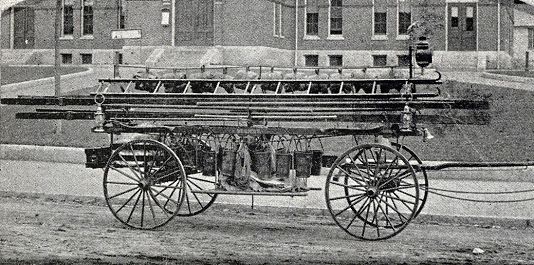
August 5, 1882 Bucket Co. No.1 receives the new bucket truck, it is believed that the house for the Bucket company was located behind the town hall just off Church St.
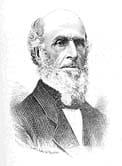
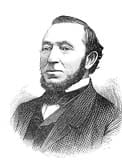
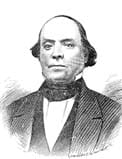
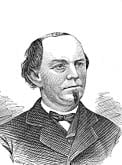
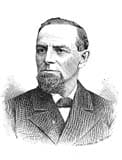
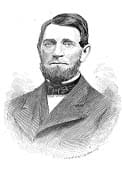
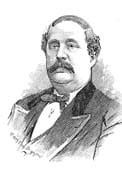
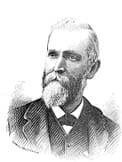
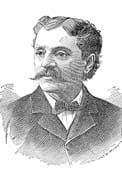

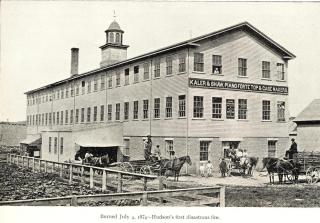
This is the Kaler & Shaw piano top factory located on Broad St. The following story was taken from an article written in the Hudson Pioneer, a weekly newspaper published in Hudson at the time.
“A young boy about six years of age was strolling along Broad St. with matches in his hands. Where near the piano factory he spied an open door and going up the stairs found a huge pile of shavings and laths in the corner. It occurred to him that it would make a splendid bon fire and suiting the action to the thought, lit a match and applied it to the pile, then ran out to call other boys to see the splendid sight. One of the boys was badly frightened and ran to his elders with the story. It was seen that the large timber structure was in immanent danger, and the wild alarm spread along the street to the engine house, the bells upon which were rung as loudly as possible, the time was around 11:30 AM. Being a holiday many people were away from town, so few were ready to man the engines, still the engines were promptly started by the few who came. The whole department was ordered to the river side in the field near the shop and foundry. It was expected that the various force pumps under Mr. Houghton’s control could be brought into action; but unfortunately this was not so. The engineer was not at hand. Meanwhile the three streams from the Assabet proved entirely inadequate in beating back and subduing the flames. Now the peril ceased to be local and the point of danger drifted town wards over barns, houses, and wood yards to shoe factories, the tannery, the depot and churches. One engine was withdrawn to the hydrant by the railroad crossing.
The barn of George A. Cotting, which was close to the factory, was now ablaze. The hose men were not able to stand the pressure. At this point from 100-150 feet of hose burned as firemen were unable to extricate it. The barn quickly burned, and the house as rapidly followed. Sparks and cinders had been sailing towards the village. Every roof was threatened, many were ablaze in patches. Wet blankets, pails of water and fountain pumps were in demand. When the peril first became manifest, telegrams flew to Marlborough, Clinton, Fitchburg, Boston, for help which was promptly made available, though subsequently countermanded with the exception of Marlborough.
The Marlborough engines came rapidly over, under engineer Balcom, and took position, Torrent No. I along side of Houghton No. 2 at the depot, and Okokammesit No.2 with Eureka No. I at the river, the first two to prevent progress of the flames town wards, and the latter two to protect wood and lumber in Kaler and Shaw’s yard and iron foundry of T.W.H. rice, close by. The Marlborough train which arrived opposite the river about 12:45pm was obliged to tarry a full hour before it was regarded safe enough to pass along with it’s load of excursionist bound to Walden pond in Concord. The tired firemen withdrew in detachments to the town hall where they were treated to refreshments furnished by the selectmen and a volunteer corps of women. Everything that could be had was generously offered; coffee, milk, crackers, pressed meat, cake, and cigars, etc. The Marlborough firemen were able to return by the 4:20pm train.
The property loss of Kaler and Shaw was estimated at $50,000, covered by $19,000 worth of fire insurance. Several firemen were hurt while fighting the fire. Probably over half the firemen were away from home at time of alarm. The structure was built in March, of 1868, then 160’ X 35’ and three stories high for George M. Guild and Co, of Boston manufacture of piano cases. In the same year the business was purchased by the foreman, S.J. Kaler, who ran it for a while and was then joined by J.H Shaw, a fellow workman and employee. A showroom was added in June 1874.”
“In 1874-1875 Houghton Engine Co. No.2 asked to town to furnish them with a new hand engine, which request was refused, in consequence of which the company disbanded. On the engine house was a bell purchased by contributions from numerous citizens. When the company disbanded the bell was taken down and carried away and hidden, the company claiming it was given to them. An article in the town warrant calling a meeting for Nov. 2nd, 1875 was to see what action the town would take with reference to recovering the bell, the town taking the position that the company neither individually nor collectively, had the right to remove it.
The discussion under this article was one of the most exciting in the history of the town and is not likely to be forgotten by those who heard it. J.T. Joslin Esq. represented the town and Henry L. Hurlburt, Esq. Of Lynn, now a prominent member of Essex bar and for some years district attorney, then a young man of this town studying law, represented Houghton Engine Co. of which he was foreman.
The next year, possibly at the spring town meeting, this matter came up again under an article to see what the town would do about the recovery of public property, particularly said bell. The selectman were empowered to take such action as they see fit, which was to commence a criminal suit against Mr. Hurlburt for the removal or larceny of the bell. The case went before Justice Joslin and was carried to the Superior court where it was settled, just how has been forgotten. The place where the bell was hidden has been a mystery all these years. Last winter Independent Hose Co. thought they would like to possess the bell and Fred J. Parsons of the company wrote Mr. Hurburt asking for it. That gentleman being willing. Fred O. Welsh as Mr. Hurburt’s agent led the Independents to it’s hiding place.
At eight o’clock Thursday evening Independent Hose Co. and friends to the number of twenty, piloted by F.O. Welsh left Wood square in teams and moved to the east part of town. On a back road in the east part of Marlborough, about one and a half miles from the city hall the missing Houghton bell was found. For seventeen years it had been buried, the owner of the property and the six young men who secreted it alone knowing where it was. Of these six men one is dead and some if not all the others now hold responsible positions in the professions and in business. The party came into town over Gospel hill.
Mr. Welsh going at once to his home, and the rest of the party making a curculios tour through the village clanging the bell, singing and serenading and winding up about midnight with a cannonade in the vicinity of the hose house. The affair was the chief topic of conversation Friday morning old and young flocking to the Independent house to view the bell. By permission of the engineers the bell will be hung on the Felton St. engine house.”
The Engine House on Felton Street was destroyed in the fire of 1894 but the bell survived and is hanging in station 1 at Wood Square…
“On Monday Oct. 6th, the Burrill house, located at the corner of Packard and Central St., was sold under foreclosure of mortgage, by Hudson Savings Bank, to the widow Whitcomb for $3.02 above the mortgage. The Burrill family vacated the premises and Frank M. Whitman, a nephew of Mrs. Whitcomb, moved his furniture in, but had not occupied it at the time the following event took place. On Friday between nine and ten o’clock P.M. fire was discovered issuing from these premises, which were entirely consumed, no water at all being put upon the flames. The Eurekas set their machine in the meadow and forced water through their pipe, but their stream fell 50 feet short of the burning building. The Independents were not present on account of internal differences in the company. The origin of the fire was incendiary, public suspicion very generally resting upon one individual; whether with justice or not, can be satisfactorily determined only by careful investigation. Mr. Whitman lost all of his furniture except for a chamber set, which was removed in a damaged condition. On the day of the sale Mrs. Whitcomb paid $100 down and the remainder was to have been paid on Saturday. It is a mooted question on the street to whom the insurance shall be paid, whether to Mrs. Whitcomb or to Mr. Burrill. The insurance was carried by D.W. Stratton in the Hartford. Shortly after three o’clock on Saturday P.M. a fire broke out in the barn of Silas Williams, on Packard St. which was burned to the ground, together with twelve tons of English hay, a very fine horse, carriage, harnesses, farm utensils and furniture, and also a calf.
The department was present, Hooks leveling the building as quickly as possible, the Buckets protecting the roof and side of the house next to the fire, while the Eurekas located in a meadow in front of the house played a weak stream of mud and water for the space of twenty minutes, when the source was exhausted. Mr. Williams who for a week had been in N.Y. on business, returned just in time to see the smoldering ruins.
Again on Sunday morning while clergyman were engaged in the opening services, another fire alarm aroused the people from their devotions and usual Sunday morning lulling, to learn on the start that this time it was the dwelling of Mr. Silas Williams.
This misfortune, following so closely on the heels of yesterdays loss, stirred the sympathies of the people and gave speed to their going, and while the department was getting to work most of the furniture was removed in excellent condition. The Buckets as usual were far ahead of the rest of the department, and had water on the fire twenty minutes in advance of the Eureka’s. This difference in time was in a measure occasioned by a conflict of authority between Capt. R.H. Brigham and Eugene Tripp. Brigham wanting to take his machine to a brook in the rear of the house and Tripp insisting that the machine must be set in the ditch in the meadow land in front of the house. Here the water was exhausted in a very few minutes, and then the machine was removed to the brook in the rear, and the fire extinguished. But while this delay and transfer was going on, the fire consumed the upper part of the L and half of the upper story, making a wreck of the remainder. Mr. Williams was in church at the time and Mrs. Williams niece and child at home. Mrs. Williams hearing a roaring overhead hurried to learn the cause and thus discovered the fire. There can be but little doubt the fire in the barn was incendiary, but the cause of the fire in the house is less easy to determine. While there are many that believe it to have been incendiary, there are others that think it caught from a defective chimney; ‘tis said holes through the mortar were found. Dr. Harriman who was passing at the time gave the alarm in the village. Mrs. Williams was sadly prostrated, having on both occasions the great responsibility of acting during the early or most exciting period of the conflagration. The house and barn were both insured in the farmers & mechanics of Worcester. D.W. Stratton as agent.
Three fires in as many days and little or no water to put upon them, and fifty, one hundred, and even a larger number of dwellings in like danger. Who is to blame? Certainly not the local press, which gave expression to notes of earnest warning subsequent to the burning of McKenzie’s houses the entire truth of which has been demonstrated in these resent fires. Again we warn the people to build reservoirs, utilize the water that runs to waste, provide an abundant surplus of leading hose, etc.. etc..
Repeating our language as follows: sunken reservoirs should be built, one in the low land to the west of Central St. and North of the line of Mass central, another, in the slough near Cottage St. one on the same natural water course in the vicinity of Lincoln St., one on Washington St. utilizing the springs at that point that make traveling so unpleasant at certain seasons of the year. The approaches to these reservoirs should be made ample and solid as well as approaches to the river on River St. in the rear of Morse Block, and just above Alvin Maynard’s also two or three approaches on Maple St. to Bruce’s pond, and some sort of water facility near Caleb Haskell’s and Riverside Park. The nearest water facility should be indicated at several points by signboards, thus making the entire community familiar with each locality. The Board of Engineers should be elected and not appointed, as the interest they supervise are second to none other, requiring at times as wise, prompt, cool and brilliant generalship as needed on any other battle field.
The department should receive sufficient practice to ensure promptness and harmony of action; the Independent and the Houghton Hose Co.’s should both be provided with first class hose, and an abundance of it, and receive practice in coupling on to the force pumps at Tripp’s, Brigham’s, Houghton’s, and the Tannery. In fact the entire department should have everything that can be possibly needed in an extensive conflagration, and keep it all in constant and perfect working order.”
“In January of 1876 on Sunday a fire was discovered in the basement or sawmill department of Tripp brothers extensive box factory on River Street. A general alarm was given and the fire department was quickly on the spot and the machine in operation. The fire had gained considerable headway before the engines were in working position, and to the lookers on the destruction of the entire property seemed inevitable, but the firemen worked with a will. The engineers directed a judicious use of the three streams from Eureka No.1 the two from the outside engines of the mill and the one stream from Volunteer No.2 and it was soon evident that the fire was under control. In the department where it took the fire made sad work, destroying even the heavy timbers of the frame, crumbling the granite underpinning, etc. The flames ran through the main structure but were only permitted to char certain portions of it. The ell however will have to be rebuilt. The firm bestows much praise on the firemen and the citizens generally, as will be seen by their card elsewhere, for their successful efforts in saving so large a portion of their property. Tripp brothers estimate their loss at $4000, and had no insurance. They commenced the work of rebuilding early Monday morning and expect to be in running order again by Saturday. One item of loss is $500 worth of belting. The fire was incendiary, evidently being set in the shavings near the saw mill and under the planer. It is not probable that the fire was maliciously set, but as two boys were seen loitering about the mill just previous to the fire it is thought they may have caused it by smoking. Much credit is due to the thoughtful neighbors and others who generously supplied the firemen with refreshments during their long service.”
This story was taken from the Hudson news.
“The disaster which was prophesied in the Hudson Pioneer of August 9, 1879, unless certain specific precautions were taken, has occurred, and property holders and insurance companies may thank their lucky stars that the loss is not many times greater than it is, that the business part of our beautiful town is not devastated, and our dearest business interests sadly wrecked. Fortunately there was no wind, only gentle zephyrs, and to this circumstance, and to this alone, can be attributed Hudson’s escape from immediate financial ruin. At fifteen minutes past eleven Sunday night the ringing of Eureka’s bell stirred a few wakeful citizens from their beds, but the sharp and continued toots of whistles shortly after, called a good portion of the community to the scene of a rapidly spreading conflagration. The fire was first discovered in a small out building attached to the west end of Main St. block and at that time could easily have been extinguished with a single pail of water. Someone foolishly smashed a window, giving vent and draft to the flames, which rapidly spread themselves over the rear of Wm. Chase’s tenements, communicating to the tin shop, and open stairway leading from the outside to the story above. Fred Strong, occupant of the tin shop, and also occupant with his family of the upper story, had barely enough time to escape with his family, everything save $5 in his pocket going down in the general wreck, though he may be able to recover something from the ruins.
Charles E. Walker, boot and shoe dealer, is left destitute, having lost, in addition to his stock, $1,160. Which happened to be in the pocket of pants left hanging in the room until he could remove his wife, who for several years has been an invalid, for the past year been confined to her room and only the previous evening brought from her fathers Wm. Chase’s to the tenement over her husband’s store. When he returned it was impossible for him to secure his money, or even a pair of shoes.
The progress of the flames from the start was rapid, aided only by the rarefied air induced by the fire, and one after another the tenants assisted by citizens, removed their effects as rapidly as possible, though of course at a considerably damaged condition. While this was going on the Fire dept. was by no means idle, but responded as promptly as could be expected, the Eurekas laying a line of hose before the fire broke out and the Independents laying another along side. The machine was set at the Tannery pond the suction unfortunately settling into mud and weeds, clogging and otherwise interfering with her playing. No sooner was the suction hose cleared than several lengths of hose burst causing still further delay, so that a full half hour passed before an effective stream was put upon the fire. At just about this time a stream from condemned No.2, another from Brigham’s and still another from the Tannery pump reached the fire at different points, which fire by this time was spread over fully one third of the block. But an additional difficulty had now to be met. Tongues of fire were seen along the eaves of the Hudson House. Slowly, almost painfully slow, they increased in number and size. A single stream played upon this building at the proper time would have saved it, but when this was done it was too late. The facts are there wasn’t one available, the Engineers not daring to withdraw a particle of their force from the block as the fire here was at it’s height, and churches and large manufactories directly in it’s possible track. As soon as it was evident that the progress of the flames was checked, the brick Shop stream was turned on to the hotel, the hose men fighting the fire from the top of Underwood’s store.
On the east side, the fire had crept to the basement, and here in Arnolds Market it ran wild gathering to itself fresh force. Since the commencement of the conflagration the ringing of the bells and the screeching of the steam whistles had been continuous, and people from all of the adjoining towns came on foot and carriages. D.F. Pope had driven back and forth through Marlboro giving the alarm and starting the entire department.
The Hooks and Okommakamesit Engine Co. accompanied by most of the members of the department and the entire board of Engineers came to Hudson’s relief, and it was well they did, as without their timely help the limit of the fire can only be conjectured. The coolness, courage, and determination of these veterans won the admiration of all observers and the enduring gratitude of all unprejudiced citizens. It is sufficient to say that the additional help and wisdom in management they brought to us, checked the fire at Underwood’s , the Hudson House being totally consumed the fire on the east being kept within the block.
What proportion of the loss is due to the heartless, lazy, selfish, gaping element in our midst it is impossible to estimate. Men in official capacity were constantly passing among the multitude trying to persuade them to relieve the faithful and exhausted firemen at the brakes, but with a limited number of creditable exceptions they failed to respond. More than this the gallant men of the Marlboro fire department who made the run with their machine in 35 minutes were obliged to work the brakes of their machine for more than half an hour after their arrival and in fact most of the time during the fire the mass of Hudsonians to their burning shame be it said, refusing to lend a hand to save property in their own town. Those who did do their duty need take to themselves none of the censure which will and ought justly fall upon the heads of those who refused to do neighborly duty. A few arrests would have brought them to their senses and duty; in fact it isn’t too late now. Large forces of men were engaged in watching and protecting public buildings and dwelling houses, and shops in the vicinity, and it is fortunate that they did, as the Town House was ablaze on the roof at two different times, and the old Baptist Church once, the air being dense with burning cinders and shingles, some of which were found a mile away. The heat from the Hudson House was intense cracking the large plate and other glass in Jefts Block almost igniting what little wood work there is about the windows and damaging the building nearly $1000. The event in question has demonstrated that it is not only economy to the individual but an advantage and protection to communities to build of brick, stone and slate, as Jefts Block if it had been of wood would surely have fallen before the fire fiend leading to a still greater disaster. The preservation of the Town House was due to the open space in front and to the water tank and sanded paint. Losses by the sufferers are named as follows: James H. Sawyer, Hudson House, loss $18,000. Charles S. Arnold, Meat Market, loss $500. L.R. Lovering, barber, loss $500. Wm. Chase, two tenements, loss $2800. Charles E. Walker loss $3000. F.W. Strong stoves, and tin ware. A.L. Maynard, loss $1200. Paul Randall, loss $1600. J.J. Underwood, loss $500. L.T. Jefts, loss $800. Henry May, loss, $1200. Ed. Miles, loss, $100. Jonas Houghton, loss $1200. Stedman Nourse, loss $1200. Obed Rice, loss on building $1200. Other tenants lost in injured and destroyed furniture and in jewelry, but to what extent they are not yet able to state. The Hudson House fell in at two o’clock, at three o’clock the fire was under control and the crowd began to disperse. At four o’clock the Marlboro firemen , nearly 300 in all were taken to the Town Hall and fed with coffee and crackers and cheese served by a corps of ladies, after which Hudson firemen were fed. Marlboreans gave cheer on cheer for our town and Department. At daylight the ruins, the Town House lawn and the streets approaching the scene of the fire presented a scene of great disorder, household furniture being scattered in every direction. In point of personal behavior all did themselves honor, scarcely any drunkenness being not found.
There are several side issues which we have not time, space or inclination to touch. Circumstances in our opinion point to incendiarism. It is also certain there is a grave neglect on our part as a community to protect ourselves, or on the part of our representative to protect us. We are inexcusably deficient in the quantity and quality of hose, in water facilities, and in portable forcing power. Our principal business thoroughfare melting before a conflagration, and three steam pumps lying still for lack of hose. Think of it citizens, and remember the following warning published in the Hudson Pioneer, Aug 9, 1879, and republished two or three weeks later. Can we move too quick!
Hudson’s Fire Department and Water Supply. This was the caption of the editorial article in the Hudson Pioneer of Aug. 16, 1879, which attracted so much attention at the time and has an increasing pertinence at this trying hour. It began by calling attention to the fact that men seem to need some startling catastrophe to stir them out of their prevalent apathy. The great lesson of the McKenzie fire at that time was that people should rise en masse and protect their lives and property by legislating additional forcing apparatus and additional and more convenient water facilities. To allow everything to hinge upon the chance that no mishap should befall Eureka engine was characterized as supreme carelessness. Over a year has rolled away and nothing has been done to avert a recurrence of dire disaster by fire save to construct a couple of reservoirs, now ready or partially ready for use. These were recommended with still others at the time; but equally important recommendations were left unheeded, and now the innocent have the bills to pay in the shape of well nigh irretrievable loses. What was then recommended and urged in addition? Let us read and see: Additional or reserve forcing power should be provided at once. If it is not feasible to patch up No. 2, why not a companion engine to No. 1 or maybe a steamer? This is not an expense the town cannot bear, but just as essential and sensible as the purchase of a safe by the Hudson Savings Bank, a sufficiently strong police force, or wise sanitary regulations. The Department should receive more or less practice, so as to ensure promptness and harmony of action; the Independent and Houghton Hose Co.’s should both be provided with first class hose, and an abundance of it, and receive practice in coupling on to the force pumps at Tripp’s, Brigham’s, Houghton’s, and the Tannery; in fact, someone should see to it that the entire Department has everything that could be possibly needed in an extensive conflagration, and that it is in constant and perfect working order; should examine certain localities and see if any precautions are needed. For instance the old block on Main street with other wooden building in the rear, would melt before a fire like ice beneath the summer sun, carrying in the general wreck more modern and valuable buildings on either side of it. Is there nothing it would be wise to do in anticipation of such an event? These suggestions would require a present expenditure of money, but who can foresee the great value or saving thereby.”
“July 25th between nine and ten o’clock Monday morning fire burst forth from the barn belonging to John Dolan, and quickly spread to the shed and house, as they were all connected. Jerry Sullivan and Peter Feeney who were at work in the meadow at the rear of the buildings, and Peter Fahey, Martin Carroll, and Albert Badger, at work on the opposite side of the road, helped at once to remove what was possible from the surely fated building. M.A. Young, an employee of John Philips came to the village on horseback and gave the alarm. Although the department responded promptly, it was probably twenty-five minutes from the time the fire was discovered before they arrived at the scene of the conflagration. The Buckets were several minutes in advance of the rest, the Hooks passed the Eurekas at Pleasant street and had ladders raised on the Philips house the by the time the Eurekas arrived. It was evident to all that nothing could be saved, and the whole force was directed to saving the large valuable buildings on the Philips-late Goodnow- place, which caught fire several times from the flying burning brands. Not withstanding there was a large working force at hand it would have been almost impossible to save said buildings had it not been for a row of large trees that stood between them and the burning buildings which caught many of the brands, three of which were ruined. The Engine Company set their machine first at the usual mud hole, and later moved to the brook near the house of Henry Hapgood, playing through 800 or 900 feet of hose. The fire was first discovered by Mrs. Dolan who was washing in a room adjoining the barn, and over whose head a tongue of flame suddenly leaped. Mrs. Dolan and the children were cared for by neighbors, on offers of all thing necessary to make the family comfortable were made on every hand. The furniture was moved into the house off Pleasant street, near the residence of William Miller, which the family will occupy temporarily at least. Besides the buildings, the losses are hay, farming tools, a calf, a pig, all the kitchen furniture and the jewelry and wardrobe of Mrs. Dolan, and many things which have a history and are valuable as tokens of love and remembrance which money cannot replace.”
